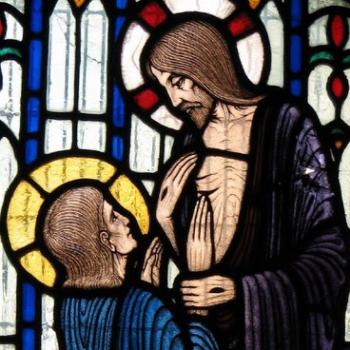“What’s the difference between chili con carne and chili con queso?” I ask my freshman students.
“One is chili with meat, the other is chili with cheese,” they reply, wanting to know why I would ask a stupid question with such an obvious answer in the middle of a class on the Gospel of Luke. As I often do, I give them a quick lesson in etymology (because, as I have told them many times, words are cool).
“The Latin word ‘carnis’ means ‘meat,’” I tell them. “It’s where we get ‘carnal,’ ‘carnivore,’ ‘carnage’ and similar words. Oh, and it’s also where we get ‘incarnation.’”

That grabs their attention. Most of my students are products of Catholic families and education, for whom the word “incarnation” is a sanitized church word used as a placeholder for the birth of Jesus. But what the doctrine of the incarnation really means is something astounding and shocking. In becoming human, God chose to “become meat.” And God still does.
One of the books I took with me on retreat a couple of years ago was An Altar in the World, my favorite of Barbara Brown Taylor’s many fine books. The book is organized into chapters by various daily human activities that, with a certain amount of attention and focus, can be turned into spiritual practices. One of my “go to” chapters is “The Practice of Wearing Skin,” subtitled “Incarnation.” Taylor argues that although many, perhaps most, of us have learned not to embrace our physicality and, depending on how we were raised, even to be suspicious of the role that our bodies might play in our lives as spiritual creatures and persons of faith, the heart of the Christian faith is rooted not in the soul, but in the body.
“Here we sit, with our souls tucked away in this marvelous luggage, mostly insensible to the ways in which every spiritual practice begins with the body,” Taylor writes. She adds that the “practice of wearing skin is so obvious that almost no one engages it as spiritual practice, yet here is a place to begin: with tears, aches, moans, gooseflesh, heat.”
The older I get, the less patience I have with philosophical and theological frameworks that split body and soul/mind apart (usually with an appropriate degrading of the value of the body). There is no such dualistic split in the gospels, but the influence of Greek philosophy (which often did make such a split) on the development of early Christian thought unfortunately saddled traditional Christianity with a tendency to ignore the basic seminal truth of the Christian faith: God became human, which means that God embraces physicality. As John’s gospel tells us, “the Word became flesh and dwelt among us.” Barbara Brown Taylor comments that “This leaves us in the peculiar position of being followers of the Word Made Flesh who neglect our own flesh or—worse—who treat our bodies with shame and scorn.”
I decided during my three days on retreat to try what Taylor calls “the daily practice of incarnation—being in the body with full confidence that God speaks the language of flesh.” The first step, for me at least, was simply noticing what my body was telling me on the most basic levels. For instance:
- My body was yelling “I’m f***ing cold!” during Vespers, overwhelming my more “spiritual” inclinations to try to see how much my four years of high school Latin would help me understand what the monks were chanting without looking at the cheat sheet provided (not much, as it turned out). I noticed with virtuous satisfaction that my hands, forearms, shoulders, and right hamstring were sore from the three hours spent shoveling the driveway at home the morning before leaving for retreat.
- I focused my attention on the tickle in the back of my throat that usually is the first sign of a cold—and talked it into going away.
- I appreciated that the shower in my little retreat hovel provided water too hot to stand under.
- I decided that the low buzzing in my ears might be the result of way too much free coffee from the common room.
- I welcomed the full body tingle—a phenomenon that I’ve come to identify with “the divine is in the house!”—that swept over me as “He Shall Feed His Flock” from Handel’s Messiah began playing on my Android.
Such observations could easily be dismissed as mundane. But another etymology is in order. “Mundane” comes from “mundus,” which simply means “world” or “earth.” Instead of looking past the physical and ordinary for what is spiritual or profound, we might do well to remember once again the most profound truth of Christianity. God became flesh, became mundane, became embodied in the world that God created. And this incarnational activity continues in us. We are God’s hands and feet—hands and feet that are made of meat. It may be that an increased focus on our carnality as God in the world is exactly what our age needs. Barbara Brown Taylor writes that:
The last thing any of us needs is more information about God. We need the practice of incarnation, by which God saves the lives of those whose intellectual assent has turned as dry as dust, who have run frighteningly low on the bread of life, who are dying to know more God in their bodies.
I grew up in the same religious world that Barbara Brown Taylor comes from and, like her, was never told in church that my body is good, or that God takes delight in our bodies. But the resurrected Jesus had a body with the marks of death still on it, a body that could be prodded, poked, and still needed to be fed. A body that he took with him back to heaven. God trusted carnality to bring divine love into the world, and God still does. This is worth remembering.
After years of watching bodies being dug out of craters in Manhattan and caves in Afghanistan, after the body counts coming from southeast Asia, Gaza, Iraq, and Syria, after multiple schools littered with corpses from gun violence, we should rememer that the incarnation ends up with a body—carnis—hanging on a cross. God in the flesh will not be spiritualized, but instead comes to us in the embodied sacraments of bread, wine, water, and feet.

















